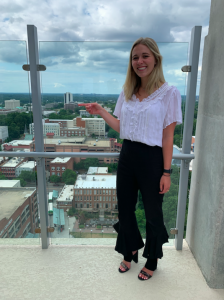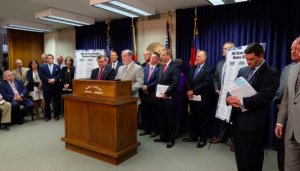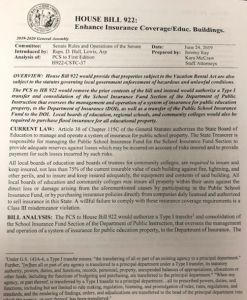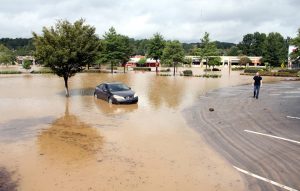
Me & the Education Building
warning: this post discusses emergencies and coronavirus
Public crises are scary, challenging, and unpredictable. As a student, avid traveler, and daughter of someone severely immunocompromised, the coronavirus (COVID-19) pandemic is a scary reality that I wasn’t expecting to experience ever in life. As a future public service leader currently working in local government, this experience serves as a unique lesson to learn how much public administrators are involved in emergency management. Emergency management is the coordination of resources and responsibilities to reduce the harmful effects of disasters, hazards, and crises. In times like these, the public relies on public administrators from varying fields and levels to provide accurate information and support as needed. So, in times of emergencies, what exactly do public administrators do?
Traditionally, emergency management encompasses four main categories: prevention, preparedness, response, and recovery. And public administrators are involved in every step along the way.
As we move through this time of concern and uncertainty with the coronavirus (COVID-19), we can rest assured that those who took the oath to serve the public are working hard to keep us as safe as possible now and will be prepared to support us as we begin to stabilize.
A special thank you to the public administrators, medical care providers, first responders, grocery store employees, and anyone else who continues working to make sure our communities have what they need as we go through this process together.
For the first time in history, North Carolina does not have an approved budget as operations of the new fiscal year are underway. Thanks to current law, there will be no government shutdown and the budget will continue to run on auto-pilot based off of last year’s budget provisions. However, we have had four days of postponed votes in the House on the potential veto override of HB 966, and there is still no conclusion on how the General Assembly plans to address the budget for the 2019-2021 biennium.
While we wait for a decision to be made on the next steps for the budget, whether they go for the override, draft continuing resolutions, or continue operating on auto-pilot, education bills have been flying through committees and sessions this week. Bills regarding teacher contract changes and new personal finance courses (SL 2019-82) as well as studies on the challenges of being an NC Pre-K site (SL 2019-87)have become session law this past week. There were a handful of bills ratified and sent to the Governor this week, including bills modifying the school success indicator (HB 411), higher education changes (HB 668), educator preparation program changes (HB 107), and adjusting the performance grading to a 15-point scale (HB 362).
There were many more education bills that moved through committees and crossed from one chamber to the other this week that will continue moving next week. It is so easy to get caught up in the bills that mandate DPI do something or directs the State Board to do something or requires the Superintendent to do something, but this week I really enjoyed following bills that directly impact and benefit students (which is of course why I am here).
SB 354: Sam’s Law would make the following changes:
The plans would require documentation from the following:
The school would be provided at least one unopened dosage of the medication from the parent and the school is required to safely and securely store the medication in an accessible location for trained school personnel and volunteers. This bill aims to eliminate the potential detrimental consequences of schools being underprepared for assisting students with seizure disorders.
SB 391: Expand Youth Internship Opportunities
Current law restricts youth under age 18 from being employed in occupations that have been declared hazardous by the US Department of Labor or deemed detrimental to youth by the NC Commission of Labor. These occupations include:
This bill creates an exception for youth ages 16-18 to participate in supervised experiences in occupations found detrimental by the Commissioner of Labor. The following conditions must be met to be eligible for the exception:
Aside from tracking and reviewing bills this week, I have also worked on proposing the amount of funding to be granted to school districts from the Mobile App Development Grant Program. It is actually awesome to see the partnerships that have developed between employers and schools and how these schools are using funds to create courses that prepare students for future work with that employer. I have also gotten to review applications for the State Board Student Advisors positions; there are only two positions (one junior, one senior) that are filled by students who serve as the representatives on the Board. We get to begin interviewing this week, and I actually suggested to the interview team best practices for interviewing candidates from HR class LOL.
Most fun I have had this week was attending networking events with my bosses. Here is a pic of me with my building from an event this week 🙂

Me & the Education Building
Boy oh boy has this week been an interesting one to say the least. Both of my bosses on the Legislative Team have been on much needed vacations so it has been just me holding down the fort over at the General Assembly. As much as I was out of my comfort zone walking around without my bosses who know, quite literally, everyone, it felt good to walk around the legislature, confidently waving back to the lobbyists, legislative assistants, representatives and senators that have started recognizing me even without my bosses.
The conference report on the budget for the 2019-2021 biennium was released Tuesday afternoon following a press conference led by Senate and House leadership. While many people in both parties are happy with most aspects of the budget, there are some still very upset that the legislature chose not to include Medicaid expansion. Meanwhile, our departments over at DPI were all in looking at the education provisions and the comparison between the budget proposals from the Governor, House, Senate, and Conference Proposed Budgets Comparison (xlsx, 143kb) which are far too vast to fully discuss here. While there was plenty of debate surrounding the budget, it was still encouraging to see people work together to help each individual county in North Carolina, especially our teachers!

Boy oh boy… Budget Report Press Conference
As noted in my bio and past blogs and as evident through my choice in PWE, I am an avid supporter of all levels of education from early childhood to higher Ed and graduate education. After attending a multitude of house and senate education committees, I was able to attend breakfast with a Senator that serves on the Senate Committee on Education- Higher Ed and K-12. He and I discussed education, immigration, public safety, insurance, motor vehicle laws, and many other policy issues—subsequently relating back how all of these policy issues directly and indirectly impact the children in our schools. Even more interesting (IDK what could be more interesting than education policy), we discussed our varying love for coffee (not Starbucks) and the Senator’s visits to the tobacco and coffee farms in Central and South America. Lastly, the Senator referred to the women in the Senate as “Rock Stars,” as he said we need more people like them (I concur).

Boy oh boy… Checking out the Senator’s newly leased Tesla ~feeling fly~
P.S. If you ever go to Flying Biscuit in the Raleigh area, get their “creamy dreamy grits” 10/10 recommend.
Finally, I had to do miscommunication management on a bill brought up in Senate Education Committee this week. A bill originally about Vacation Rentals was severely altered with a Proposed Committee Substitute to move the School Insurance Fund Section of the Department of Public Instruction that oversees insurance for LEAs (schools) to the Department of Insurance. The issue with the PCS is that DPI had not been aware of any changes being made to their insurance fund for LEAs. DPI representatives addressed the committee, telling them about their confusion with the bill. Consequently, a senator asked the bill sponsor if the Superintendent supported the bill. I am going to positively assume that there was a miscommunication, because the bill sponsor responded that the Superintendent does support the bill. Having my bosses out of town and being “just the intern,” I was stuck speechless. Following multiple calls and informal meetings, the big bosses were able to do some damage control so we shall see where the bill proceeds next…

HB 922 PCS- DPI to DOI
Needless to say, it was a pretty eventful week and boy oh boy am I ready for @Kevin and @Wade to be back from vacation! No one EVER said government was going to be easy and I absolutely love that about it 🙂
It’s been a wild couple weeks meeting with legislators to ensure the necessary education provisions are included in the budget. As we wait for conference to come to an end, we are hopeful that increases in teacher pay, classroom school supply funding for teachers, computer science programming, school lunch co-pay vouchers, and many other provisions will be included in the budget. It will get crazy intense once we see what Governor Cooper chooses to do, considering there is no talk of Medicaid expansion in the budget currently. Right now, it’s just a waiting game…
In the meantime, I have been attending House and Senate Rules, Education, and Appropriations committees that have any of our bills that we are tracking. We’ve heard, met about, and spoke on bills pertaining to career and technical education (CTE), rehiring high-need teachers that have retired, expanding youth internship opportunities, approval of charter school facility bonds, modification of the school quality/student success indicator, modifying teacher licensing requirements, advanced math course enrollment, and many others that we have our hands in.
It has been interesting to see the dynamic of an elected Public Administrator of education. Most states have an appointed Superintendent or Commissioner of education, rather than an elected one. The impact of elections and public scrutiny definitely take a toll on positions like the Superintendents, and seem to restrict him and his office from trying new ideas, piloting programs, and making riskier choices that could be beneficial to schools, teachers, and students. While many people demand change, they do not respond positively when changes are made—to put myself in his shoes, it has to be SO challenging to be a young official with new ideas to offer that is consistently shut down when introducing new ideas. Talking with a state board member brought up this difference in appointed and elected superintendents. If this position was appointed, he or she would not be so dependent on the sway of elections; rather, he or she could make choices that experts and researchers may suggest but that the average joe may not understand. That gets back to the question, though, of whether or not these administrators are there to serve the “will of the people” or to do what’s best for the people (those two may not always align).
The most fun part of my job thus far is working with my bosses (@Kevin @Wade) on the Legislative Team who always keep me laughing. They have introduced me to literally HUNDREDS of people at DPI and in the legislature. While it’s been a whirlwind, I am finally catching on to the norms, culture, and power structures of the varying groups and agencies that come together (or push apart) during this budget season. Looking back over my courses of the past year, I have seen an accumulation of institutions and values of public administration and politics, law of course, communication (communication, communication, communication!!!), research and evaluation, intergovernmental relations, organizational theory, human resources, and BUDGETing—Turns out, I’ve learned a few things over the year! And I have loved seeing it in action these past few weeks.
Well, I finished my first day in the office of North Carolina Superintendent of Public Schools, Mark Johnson. It has been my dream for as long as I can remember to be a part of state education policy and administration. I have prayed about finding a position where I can be the link between schools and policymakers—where I voice the priorities and needs of teachers, administrators, students, and parents to policymakers, ultimately influencing their policy decisions surrounding K-12 education. As an intern with the legislative team, I have already interacted with legislators following the release of the General Assembly’s 2019-2021 biennium budget on my first day. We attended appropriation committee meetings, made phone calls, met with legislative staff, and drafted amendments all before 10:00 am the next day when amendments were due to make sure the Superintendent’s priorities were included in the proposed budget.
I am already questioning the dynamics of the politics-administration dichotomy often debated by scholars and our cohort alike. As Woodrow Wilson wrote, “The field of administration is a field of business. It is removed from the hurry and strife of politics…. Administration lies outside the proper sphere of politics. Administrative questions are not political questions. Although politics sets the tasks for administration, it should not be suffered to manipulate its offices.” While I only have a first glance at the inner workings of the department, I am not so sure I agree with President Wilson. The legislative team of the superintendent was certainly in the “hurry and strife of politics” on my first day to ensure that the “set tasks for administration” align with the priorities and values of the administrators. I have defined our team as “public sector lobbyists” that lobbies from within the department—that is certainly not outside the “proper sphere of politics” that President Wilson suggested.
Despite the overwhelming feeling of first day feels, the anxious look in my eyes as I wander around lost, and the flurry of remembering everyone’s names, I still feel valued, supported, and needed here. I am so excited to continue pursuing my passion for serving children through bettering education policy one day at a time. It is going to be a crazy few weeks, working late nights as the G.A. moves towards passing the new budget and going to conference. Following the passage of the budget, I am eager to start working with the policy team to figure out implementation policy. First day finished, feeling fine 🙂
This week’s blog post looks at the MPA degree in the context of emergency management and shares the perspective of Max Dixon, a current MPA student.
One of the most crucial responsibilities of the public sector is emergency management: preparing and responding to disasters. The recent devastating effects of hurricanes in the southeast remind us how important this work actually is. When the worst happens, we have to rely on trained professionals to help us. University of New Orleans Professor and former chair of ASPA’s Section on Emergency and Crisis Management John J. Kiefer says that Emergency Management is “at its core, public management” (2013). Esteemed scholar of Emergency Management William Waugh further defines it as “the management of risk so that societies can live with environmental and technical hazards and deal with the disasters that they cause” (2000, cited in the above-linked paper).

Chapel Hill is among many communities in North Carolina that have seen flooding in recent hurricanes. (Photo: Durham Herald Sun.)
An MPA degree is important because government agencies and nonprofit aid organizations need skilled professionals who effectively and efficiently guide emergency responses, getting resources where they need to be as soon as possible to help those with immediate needs. The MPA Program can help prepare professionals for these situations. For example, we need people who are able to manage relationships across levels of government (Intergovernmental Relations), understand funding streams and reporting responsibilities (Public Budgeting), and lead and motivate teams in times of crisis (Public Service Leadership and Organizational Theory). We also need the skills to evaluate previous disasters and collect relevant data to analyze how we did and how we can do better in the future (Analysis & Evaluation, Performance Management).
Max Dixon is a current second year MPA student. His Professional Work Experience this past summer was with Cumberland County Emergency Management and he has served in many different roles in the United States Army. I asked him about how MPA courses affected his experience. He said that “organizational theory set me up well for understanding how the system is put together with overlapping layers of local, regional, state and federal resources and trying to figure out the lines of responsibility and authority.” He added that “PUBA 711 (Public Service Leadership) will likely be beneficial to anyone going straight from the MPA program into emergency management.” For those at the beginning of their careers with little experience in the field, “understanding their own leadership styles and how stress effects them should prove very useful.”

MPA Matters seeks to explore and explain all the current happenings and pursuits of those interested in public administration and public service. Special focus will be put on highlighting careers in public administration and the current initiatives of the MPA at UNC program including our faculty, current students, and alumni.